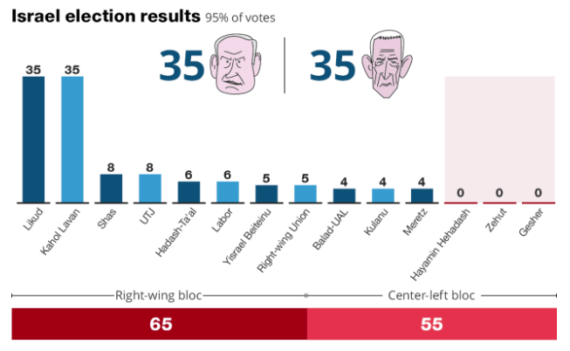Netanyahu Wins Yet Another Term
Both major parties have claimed victory but it certainly looks like Likud will hang on.

While the results are chaotic, it looks like Israeli Prime Minister Netanyahu will hang on to power for an unprecedented fourth straight term. The NYT summarizes where we stand:
• Prime Minister Benjamin Netanyahu was in
position to win a fourth consecutive term on Wednesday, with nearly all of the votes counted. But the race was extremely tight, and his main rival, Benny Gantz, had also claimed victory, though he later tempered expectations.
• When the ballots are fully counted, it will be up to President Reuven Rivlin to choose the party leader he believes has the best chance of assembling a parliamentary majority. Mr. Netanyahu’s Likud party and Mr. Gantz’s Blue and White alliance were running neck and neck, but a count of the broader blocs supporting each party gave Likud a clear advantage in being able to form a governing coalition.New York Times, “Israel Elections Live Updates: Netanyahu Is on Track for Victory”
• Regardless of the final result, the election appeared to be a grave scare for Mr. Netanyahu, 69, who has led Israel for a decade of relative security and prosperity. More than a million Israelis voted for Blue and White, a record for a new party, placing it in the position of being the main alternative to Israel’s right wing, a spot held for decades by the Labor Party.
Haaretz describes the situation thusly:
Prime Minister Benjamin Netanyahu has all but secured a 5th term on Wednesday morning, after more than 95 percent of the votes gave the right-wing bloc a 10-seat lead over the left.
Netanyahu’s Likud tied with Benny Gantz’s Kahol Lavan party with 35 seats each. Both leaders made victory speeches after the exit polls, vowing to be “everyone’s prime minister.”
But almost all right-wing parties have said they would recommend to the president that Netanyahu form the next ruling coalition. Naftali Bennett and Ayelet Shaked’s Hayamin Hehadash, as well as the far-right Zehut party led by Moshe Feiglin and Orly Levi-Abekasis’ Gesher did not make it past the electoral threshold.
In the right-wing bloc, the parties that made it into the Knesset are Likud, United Torah Judaism, Shas, Yisrael Beiteinu, Right-wing Union and Kulanu. In the center-left bloc, the parties that made it into the Knesset are Kahol Lavan, Hadash-Ta’al, Labor, Meretz and United Arab List-Balad.
Haaretz, “Israel Election 2019: Right-wing Bloc in Clear Lead, Netanyahu Promises to Form Government ‘Swiftly'”
They offer this helpful chart:

This illustrates beautifully the point Steven Taylor frequently makes here about how much institutions matter. Nobody “won” the election per se because Israel has a multi-party system. But even though the two leading parties got the same number of votes, Likud has an easier path to putting together a governing coalition.
In the context of this cobbled-together outcome, I was surprised to see an op-ed titled “Why Israel Still Loves Netanyahu” on the front page of the NYT. Thankfully, the actual analysis from Shmuel Rosner is much better than the headline would suggest. The key bit:
Mr. Netanyahu may be cynical but he doesn’t rig elections. He wins fairly, often against great odds, including, this time, the coming indictments against him and
an understandable fatigue with his decade-old leadership, not to mention various other inter- and intraparty squabbles. But he seems to have succeeded again this time for the same reason he has dominated Israeli politics for most of the past 25 years: because when it comes to Israel’s national security, he is a leader with strategy and vision. And that is what many voters want.In the mid-1990s, during his first term as prime minister, Mr. Netanyahu rejected the assumptions underlying the peace process with the Palestinians. At the time this was considered daringly right wing. Today, it is considered common sense in Israel, including by Mr. Netanyahu’s political rivals. Likewise, Mr. Netanyahu was one of the first politicians to recognize Iran as the main threat to Israel’s
survival, and fought fiercely in international forums to get the world’s attention to this problem. Today, this view is also widely appreciated across the Israeli political spectrum.The list goes on: In 2005, he warned that withdrawing Israeli troops from Gaza would end in disaster — and it did. He successfully resisted eight years of the Obama administration’s pressure to offer concessions to the Palestinians. He quickly forged an alliance with President Trump that has already proved to be of great benefit to Israel. In two years, Mr. Trump has moved the American embassy from Tel Aviv to Jerusalem, withdrawn from the nuclear agreement with Iran, recognized Israel’s sovereignty over the Golan Heights, and on Monday, designated Iran’s Islamic Revolutionary Guard Corps as a terrorist organization.
Blue and White tried to make this election a referendum on Mr. Netanyahu. Its campaign focused largely on the prime minister’s personal failings, the corruption accusations against him, and exhaustion with his leadership. But in Israel, security trumps all other issues. (A poll ahead of the election found voters rated security as their No. 1 concern.)
That’s a reasonable reading of the situation.
President Trump has already called to congratulate Netanyahu.





Netanyahu and Likud have broken the relationship between Israel and Diaspora Jews, like myself. He’s substituted Evangelical Christians and a senile head-case in the White House. Israel has become ‘Republican’, while American Jews are Democrats. Israel is a small, isolated nation surrounded by people who wish to see it destroyed, and now, thanks to Likud, the people who were most devoted to Israel no longer care.
You really agree with Rosner’s positive assessment of Bibi’s views on Iran, the peace process, the moving of the Israeli embassy, the close relationship with Trump, and so on? The “analysis” here is loaded with uncritical adulation toward Bibi’s politics and policy.
@Kylopod: Like @Michael Reynolds, I think Netanyahu is Israel’s Trump–just smarter and not mentally ill. But I think Rosner accurately describes why Israelis keep Netanyahu around. Like Trump but with more cause, he’s successfully manipulated public fear as a political tool.
As a Jewish American, I find this blatant Alliance of Corruption between Trump and Bibi to be very disappointing.
And any criticism of Bibi equates to antisemitism? Bullshit.
He is a corrupt politician, in a very powerful seat of power. The Prime Minister’s religion is as important as his haircut.
That’s one of the great political lies of late…that any criticism of Likud and its policies are somehow “anti-Semitic”…certainly Netanyahu can continue all of his policies until he gets indicted and removed for corruption…but this movement of Israel towards a fully apartheid state will not end well for that country…
@James Joyner:
Rosner is not “describing” the situation, he is gushing over both Bibi and Trump. He credits Bibi with having “forged an alliance with President Trump that has already proved to be of great benefit to Israel” such as moving of the US embassy, withdrawing from the Iran Deal, and “recogniz[ing] Israel’s sovereignty over the Golan Heights.” The notion that any of those things are of great benefit to Israel is questionable at best. Rosner isn’t engaging in a neutral analysis, he’s doing a puff piece on Bibi and using it to “explain” Bibi’s appeal to an electorate whose views he shares.
Moreover, he glides over the fact that Bibi has not been winning massive majorities, he’s been winning tight victories in which he has to cobble together razor-thin coalitions in order to form a government. That’s normal in a parliamentary system, particularly one with extreme PR like Israel, but it’s not indicative of any massive public affection for Netanyahu; in point of fact, he’s long had significant enemies on the right, some of whom form part of the Blue and White opposition party. (And let’s put aside for the moment the recent news that Likud activists were caught placing cameras at Arab polling stations, which calls into question Rosner’s assertion that Bibi’s success isn’t due to election-rigging.) You admit that the title of the piece “Why Israel Still Loves Netanyahu” is unfortunate, but it’s actually an accurate description of the tone of the piece. Rosner is uncritically singing Bibi’s praises and attributing his political success to the Israeli public’s devotion to a man whose party never gets more than about 25% of the vote and who has just barely survived oblivion in the past couple of cycles. It’s in the same vein as Karl Rove’s claim that Bush had earned a “mandate” after his narrow reelection.
@Kylopod:
I think it’s also worth exploring how specific demographic shifts (including immigration policies) come into play as well. For example, there’s an argument that Bibi’s success was partially tied to an influx of more conservative Jews from Russia and other former Eastern Bloc countries, shifting the overall center rightward:
https://www.npr.org/2013/01/02/168457444/on-multiple-fronts-russian-jews-reshape-israel
@mattbernius: The 1977 upset election that brought Likud to power for the first time in Israel’s history was partly attributed to working-class Mizrahi Jews who felt abandoned by the secular Ashkenazi elite.
I mistrust any politician who stays in power so long, and this includes decent ones like Angela Merkel and FDR.
@An Interested Party:
While I completely agree, I think it’s also important to note that the BDS movement really does have a fair chunk of anti-Semites. Not the majority, but enough to give me pause, and enough to give ammunition to the right-wing claims of criticism of Israeli policies as being anti-Semitic.
One of the things I find most insidious and damaging about the claims that criticism of Israeli policies is anti-Semitism is that the inevitable defense gives cover to the anti-Semites who are clever enough to couch their anti-Semitism in the right terms — apartheid rather than Christ killers, etc. And any attempt to call out the actual anti-Semites gets lost in the nonsense accusations.
Anti-Semitism runs across the political spectrum, and it runs deep.
On the right wing, they seem to hate Arabs and blacks more, but once they get their tiki torches, they slip into “Jews will not replace us”, and 1488 nonsense. On the left, it’s more subtle.
Sure, while that same right-wing ignores the anti-Semitism within its own ranks, including people in Trump’s orbit…
If what Likud wants to do isn’t apartheid, I don’t know what is…perhaps ethnic cleansing might be a better term to use…
@An Interested Party:
The problem is, the apartheid analogy predates Likud’s to power, the Oslo Accords, or even the Six Day War. Per Wikipedia, the analogy was used at least far back as 1961 and has been continuously invoked as a talking point among Israel’s critics no matter who was in charge of Israel’s government or what it was doing. The analogy was always questionable at best, unless it happened that 20% of South Africa’s population consisted of blacks with full legal and political rights, who regularly voted and had seats in the government, while the “apartheid” referred strictly to the situation in territories captured during a war, and furthermore, that the white population was there not due to mere conquest, but because they had been escaping a mass genocide that had decimated them in the places they came from, and they themselves had a historic connection to the land stretching back to ancient times. In short, “Israeli apartheid” has long been an inflammatory comparison applied to a situation far more complex than South Africa.
It’s one thing to argue (as John Kerry did a few years ago) that the Israeli government, at present, is moving in an apartheid-like direction. But people who make this argument should be sensitive to the history of the analogy as part of a worldwide campaign to delegitimize Israel long before any of the policies the current critics complain about were in place.
Yes, the “anti-Semitism” charge is thrown around thoughtlessly by many defenders of the current Likud government, but it also remains true that there has long been, going all the way back to the state’s founding in 1948, a shadowy boundary between attacks on the Jewish state and attacks on the Jewish people.
I did not know that history, thank you for the information…
Ironic, than, that Netanyahu and Likud are doing plenty enough on their own to delegitimize Israel…
Also, per your link…
A fair enough point…but what happens to moral validity if Netanyahu really does annex settlements in the West Bank? Also from the link…
It’s one thing to separate the two populations, but it’s quite another to create the Middle Eastern version of Bantustans for the Palestinians…
In the end, yes, of course anti-Semitism is a real thing and many people will use the excuse of Likud policies to mask their own anti-Semitism…but, for anyone who cherishes Israel and the idea of a Middle Eastern homeland for the Jewish people, how are Netanyahu’s words and deeds helping with that…
@An Interested Party:
It’s very ironic. I’ve been saying for a while now that Netanyahu seems intent on turning Israel into the caricature its harshest critics have unfairly depicted it as for decades.
@An Interested Party:
And this we accept the anti-Semites involved in BDS, who help apply pressure (mostly ineffectively) to change the direction of Israel. But we should be prepared to jettison those freaks as soon as Likud is out of power.
I want a Jewish homeland. I want to construct it by carefully arranging the boundaries so that the Jewish people are always in an 80+% majority or so, and the Arabs are a tiny minority with no real power in Israel. It’s the two state solution. It has its own problems, but they are lesser problems.
I also want any Jews in the Palestinian State to have full citizenship rights in Israel upon migration, and vice versatile.
It’s a kinder, gentler ethnic cleansing with carrots rather than sticks or genocide. I’d prefer people learn to live together in harmony, but I’m not that naive.
It’s also similar to my desire to cede Eastern Washington to Idaho — people should be able to have the government that they want, current borders be damned.
But that doesn’t really work until the Palestinians get their own state, and Netanyahu is trying (and apparently succeeding so far) to make that impossible…